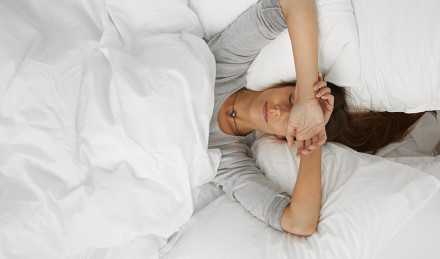We all know that we should be aiming for about eight hours of shut-eye each night. But despite that, 35 percent of adults get seven hours or fewer. While that may not seem like a big deal, sleep-deprivation has some serious effects on your body – beyond just making you cranky. So what happens to your body when you don’t log enough hours between the sheets? Turns out, a lot…
For most people, anything less than seven hours will leave you feeling it mentally and physically. Your cognitive skills, decision-making abilities and coordination suffer, and your reaction time to pretty much anything slows. Losing just one hour of sleep reduces your ability to process memories and retain knowledge (studies have shown that your brain sorts and stores information while sleeping) — and your short term memory is affected too, resulting in diminishing ability to recall what you learned that day.
Getting less than seven hours of shut eye is also bad for your health. Lack of sleep weakens your immune system — one Carnegie Mellon University study found it tripled your risk of coming down with a cold — and increases your risk of cardiovascular disease.
Because too little sleep makes it harder for your body to properly metabolize food, it also affects your ability to lose or maintain your weight. For some, lack of sleep may even reduce your sex drive.
For most people, anything less than seven hours will leave you feeling it mentally and physically. Your cognitive skills, decision-making abilities and coordination suffer, and your reaction time to pretty much anything slows. Losing just one hour of sleep reduces your ability to process memories and retain knowledge (studies have shown that your brain sorts and stores information while sleeping) — and your short term memory is affected too, resulting in diminishing ability to recall what you learned that day.
Getting less than seven hours of shut eye is also bad for your health. Lack of sleep weakens your immune system — one Carnegie Mellon University study found it tripled your risk of coming down with a cold — and increases your risk of cardiovascular disease.
Because too little sleep makes it harder for your body to properly metabolize food, it also affects your ability to lose or maintain your weight. For some, lack of sleep may even reduce your sex drive.
Here’s Another Way to Break it Down
After 17 hours of wakefulness, the average person begins to function like someone with a blood alcohol content of .05 percent. That means that if you get up at 6 am, by 11pm your cognitive and reactive abilities are just below that of someone who’s legally drunk.
After 18 hours, your body really starts to take a hit. At this point, you’re not giving yourself enough time to properly recharge and repair, and your mental functions are well below normal. To provide some context: Drivers with fewer than six hours of sleep are three-times more likely to get in an accident due to drowsiness, and people who sleep less than six hours a night are 30 percent more likely to become obese than those who sleep longer (sleep deprivation stimulates your appetite and makes you crave high-fat, high-carb foods).
After 24 hours, you’re legally drunk.
And skimming on the shut-eye multiple days in a row has a multiplier effect. Five days of consecutively sleeping four to six hours a night will reduce your cognitive abilities to as if you’ve experienced 24 hours of continuous wakefulness — those five hours you get the night before barely even matter. Ten days of this, and it’s like you’ve gone a full 48 hours without sleeping. Your body just can’t keep up.
Here’s Another Way to Break it Down
After 17 hours of wakefulness, the average person begins to function like someone with a blood alcohol content of .05 percent. That means that if you get up at 6 am, by 11pm your cognitive and reactive abilities are just below that of someone who’s legally drunk.
After 18 hours, your body really starts to take a hit. At this point, you’re not giving yourself enough time to properly recharge and repair, and your mental functions are well below normal. To provide some context: Drivers with fewer than six hours of sleep are three-times more likely to get in an accident due to drowsiness, and people who sleep less than six hours a night are 30 percent more likely to become obese than those who sleep longer (sleep deprivation stimulates your appetite and makes you crave high-fat, high-carb foods).
After 24 hours, you’re legally drunk.
And skimming on the shut-eye multiple days in a row has a multiplier effect. Five days of consecutively sleeping four to six hours a night will reduce your cognitive abilities to as if you’ve experienced 24 hours of continuous wakefulness — those five hours you get the night before barely even matter. Ten days of this, and it’s like you’ve gone a full 48 hours without sleeping. Your body just can’t keep up.
So stop pushing yourself when you’re really just holding your body back. Get in bed and give yourself the sleep it deserves. Browse our blog for some helpful tips.
So stop pushing yourself when you’re really just holding your body back. Get in bed and give yourself the sleep it deserves. Browse our blog for some helpful tips.




